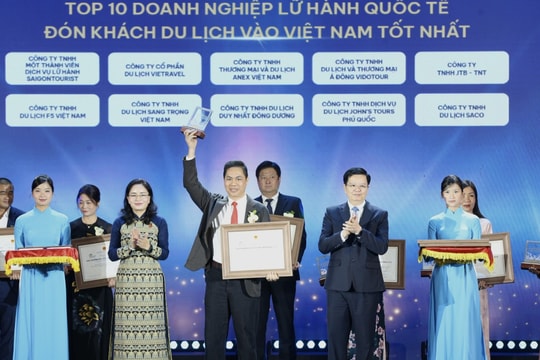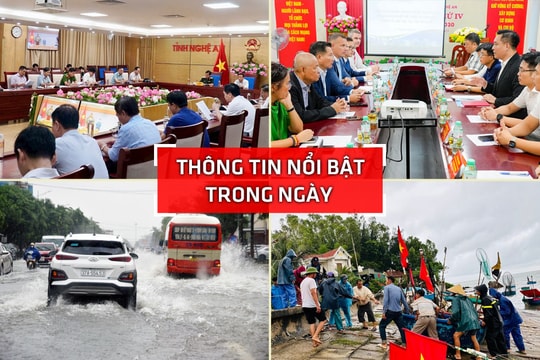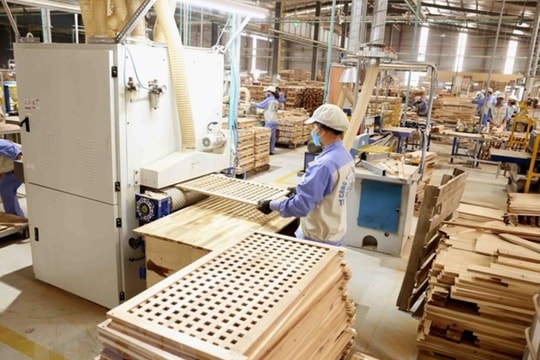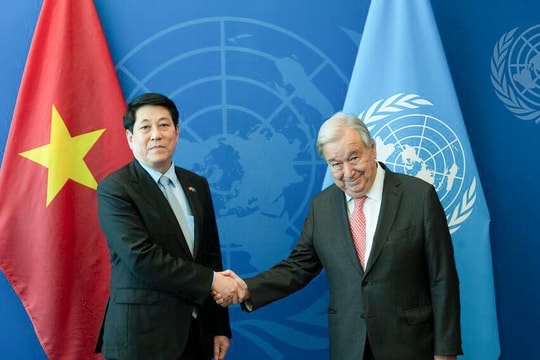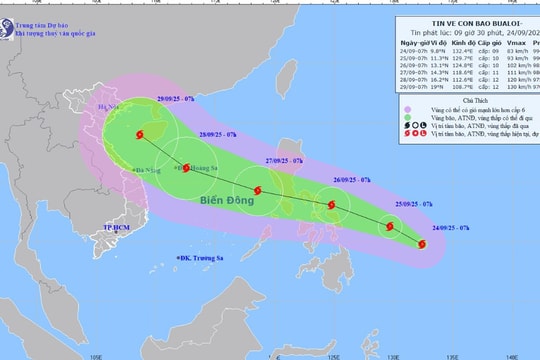'The Vietnamese Government always accompanies Japanese investors'
Deputy Prime Minister Trinh Dinh Dung emphasized: We will always accompany Japanese investors and your success is our success.
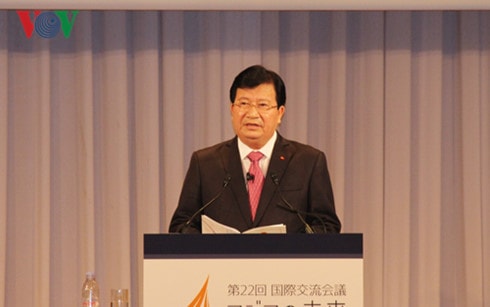 |
| Deputy Prime Minister Trinh Dinh Dung speaks at the conference |
As reported, on the morning of May 30, the 22nd Conference on the Future of Asia opened in Tokyo, Japan. Deputy Prime Minister Trinh Dinh Dung led a high-ranking Vietnamese delegation to attend the Conference and delivered an important speech.
Baonghean.vn respectfully introduces the full text of Deputy Prime Minister Trinh Dinh Dung's speech at the 22nd Conference on the Future of Asia:
Dear Mr. President,
Ladies and Gentlemen,
First of all, I would like to thank the Organizing Committee for inviting me to attend and speak at the 22nd Conference on the Future of Asia – a prestigious policy dialogue forum on many issues that have a great impact on the future of the continent and the world. I highly appreciate the choice of the Conference theme “Rising to Respond to Global Challenges and Realizing Asia’s Potential” as appropriate to the current Asian context.
On this occasion, on behalf of the Government and people of Vietnam, I would like to express my deep sympathy and condolences to the people and Government of Japan for the great loss of life and property caused by the recent earthquake in Kumamoto province. We believe that with the determination, resilience and solidarity of the Government and people of Japan, you will overcome difficulties, soon overcome the consequences of natural disasters and rebuild and develop the affected areas.
Ladies and Gentlemen,
Over the past two decades, Asia has made great achievements in socio-economic development, helping hundreds of millions of people escape poverty. However, to maintain economic growth and ensure sustainable development, Asia is also facing many difficulties and challenges.
Non-traditional challenges such as environmental pollution, epidemics, climate change, rising sea levels, water security, food, energy, etc. are becoming more and more serious and have a profound impact on global and continental development. The recent earthquakes in Japan, Myanmar, India, severe drought and serious saltwater intrusion in Southeast Asia, especially in Vietnam, further demonstrate that the continent's socio-economic development still has many potential risks. The problem of sustainable development, especially the balance between economic growth and environmental protection, is not easy to find a solution, especially for developing countries. The increasing rate of population aging and the increasingly clear gap between rich and poor have led to many social instabilities.
Meanwhile, the recovery of the world economy is still unsustainable and contains many risks and instabilities. The prolonged impact of the financial crisis and economic recession, the decline in global trade; the fluctuation and sharp decline in oil prices; the slowing growth and vulnerability of many developed countries and even emerging and developing economies considered the driving force of the global economy are major risks that we have to face.
We cannot have a prosperous Asia without a peaceful, stable, secure and safe environment. The emergence of many hot spots, especially the increasingly tense and complicated developments in the East Sea and the East China Sea, requires more efforts in building trust, strengthening cooperation and working together to resolve the issues, not only from Asian countries but also from the international community.
However, Asia is also facing many new development opportunities to rise up and continue to affirm the continent's position as a driving force of the global economy in the 21st century. There are many bright spots in Asia's development; of which, I would like to emphasize the following three main points:
Firstly, the achievements and development experiences over the past two decades have created an important foundation for Asia's development in the coming period and helped Asia respond more effectively to new challenges. Converging many large and emerging economies, with an abundant labor force and a dynamic business sector, the Asian economy is forecast to continue to grow at an average growth rate of about 6% in the next 5 years. The urbanization process and the rapid development of the middle class help create internal momentum for economic growth, labor market development and consumer market.
Second, economic linkages between countries are strongly promoted through the formation of free trade agreements, opening up a wide space to promote economic, trade and investment cooperation. These agreements also contribute significantly to guiding countries to standardize and perfect the operating mechanisms of their economies.
The ASEAN Economic Community (AEC) was officially established at the end of 2015, creating a common market and a unified production space with a population of over 600 million people and a GDP of nearly 3,000 billion USD. Investors and businesses will benefit from a favorable, transparent and equal investment and business environment. The AEC also fully integrates into the world economy and global supply chains through free trade agreements between ASEAN and its partners.
The Trans-Pacific Partnership Agreement (TPP) signed in February 2016 has created a comprehensive and in-depth cooperation framework for member countries. This is both the basis and an important driving force for countries to promote economic activities between the two sides of the Pacific.
In addition, we must also mention the Regional Comprehensive Economic Partnership (RCEP), the China-Japan-Korea Trilateral FTA, and many connectivity initiatives being implemented at the sub-regional, regional and inter-regional levels.
Third, the urgent need to transform the development model towards sustainable development has become a common perception among countries in the continent. Asian governments are making efforts to restructure the economy, promote green growth, and improve labor productivity. A series of reform measures have been and are being implemented to improve the efficiency of resource use, create a level playing field for businesses, encourage innovation, develop technology, and improve infrastructure systems.
Ladies and gentlemen,
We understand that seizing opportunities and preparing the necessary conditions is vital to the success of each country. For small countries with limited resources, a creative, flexible, and even bold approach is needed. The experience of innovation over the past three decades in Vietnam shows that dynamism, creativity, the ability to adjust policies promptly and the entrepreneurial spirit are decisive for the development of the economy.
Over the years, Vietnam has been considered one of the most dynamic economies and an attractive destination for investors. To date, there have been over 100 countries and territories investing in Vietnam with over 21,000 projects, a total registered capital of nearly 290 billion USD and over 100 of the world's leading multinational corporations present in Vietnam. The four main reasons for this success are: solid political and social stability; stable macroeconomics with a relatively high growth rate and a "golden" population structure; a market economy deeply integrated into the regional and world economy; and a constantly improving business investment environment to facilitate the operations of businesses and investors.
However, we understand that what has been achieved has only partially exploited Vietnam's potential. Therefore, the Vietnamese Government has been implementing synchronously and drastically many measures to help the economy develop rapidly and sustainably, striving to soon turn Vietnam into a modern industrialized country.
Firstly, Vietnam is actively restructuring the economy in conjunction with transforming the growth model to improve efficiency and competitiveness, focusing on the areas of public investment, finance and banking, state-owned enterprises, and agriculture associated with new rural development. In the next three years, the total value of equitization of state-owned enterprises is estimated to reach tens of billions of US dollars, of which a portion will be listed on the stock market. This is a very good investment opportunity and I hope that Japanese enterprises will not miss it.
Second, the Government pays special attention to building a favorable and transparent investment and business environment; creating conditions for foreign enterprises to invest, produce, do business, compete equally and succeed in Vietnam.
In 2016, we aim to reach the average level of ASEAN-4 countries on a number of important indicators such as business start-up time, investor protection, and credit access index according to the World Economic Forum's ranking. The amended Enterprise Law and Investment Law have many more open and relaxed regulations, creating conditions for all economic sectors to develop, without distinction between foreign and domestic enterprises in the State's investment incentive policies.
Third, to create a new “rebound” for the economy, we are determined to reform and accelerate the implementation of strategic breakthroughs, focusing on economic institutional innovation, prioritizing infrastructure development and high-quality human resources. We understand that people are the core and decisive factor and will continue to allocate adequate resources and promote human resource training, especially high-quality human resources, to meet development needs.
Fourth, along with domestic reforms, Vietnam continues to proactively promote international integration, creating a wider development space for Vietnamese businesses and people as well as foreign investors and businesses in Vietnam. As a member of the ASEAN Economic Community and with the signing of new-generation free trade agreements with major partners, Vietnam will become an important link in a large economic network with nearly 60 partners, including all the world's leading economies such as the United States, the EU, Japan, China, Russia, India, etc.
We believe that efforts to improve economic institutions and international integration will help Vietnam build a highly competitive economy, develop environmentally sustainable and socially harmonious, while opening up many new opportunities for domestic and international investors.
Ladies and gentlemen,
In addition to the efforts of individual countries, cooperation and policy coordination among countries, especially within the same region, is indispensable. To effectively respond to challenges and move towards common prosperity for the whole region, we need to focus on the following issues:
Firstly, maintain peace and stability in the continent through strengthening cooperation and building trust between countries and peoples; respecting the independence, sovereignty and legitimate interests of each country; resolving disagreements and disputes over territorial sovereignty and seas and islands by peaceful means in compliance with international law, in accordance with the United Nations Charter and regional commitments and agreements. Promote existing cooperation frameworks, especially ASEAN forums, ASEAN with partners, EAS, APEC, ASEM, etc.
Second, strengthen hard and soft connectivity, further facilitate trade, investment and labor movement between countries; develop human resources and maintain social harmony through people-centered development policies.
Third, promote cooperation in seeking long-term solutions to non-traditional security challenges on the basis of ensuring balance and harmony of interests, aiming at sustainable development of the whole region. Cooperate and support less developed countries in implementing the United Nations Sustainable Development Goals 2030. Implement commitments on climate change at COP21; promote innovation and application of science and technology in responding to climate change, developing clean energy, renewable energy, ensuring food security, water security, etc.
Ladies and Gentlemen,
The Vietnam-Japan Extensive Strategic Partnership for Peace and Prosperity in Asia is increasingly strengthened by the deep political trust between the two countries, the close economic ties as well as the common commitment to peace, cooperation and development of the region.
Japan has always been Vietnam’s leading investor and trade partner. Two-way trade turnover in 2015 reached 28.5 billion USD. Currently, there are about 2,000 enterprises, including the presence of most of the leading Japanese corporations, investing in Vietnam, with more than 3,000 projects and a total investment capital of nearly 39 billion USD.
I am pleased to see that many Japanese enterprises have been very successful and have plans to further expand their business scale in Vietnam. I suggest that Japanese enterprises focus on investing in high-tech, environmentally friendly fields, supporting industries, agriculture and the six priority industries in Vietnam's Industrialization Strategy: electronics, agricultural machinery, agricultural and aquatic product processing, shipbuilding, environment and energy saving, automobile and auto parts manufacturing.
The two countries’ participation in the TPP Agreement also opens up many new opportunities for both sides. With a large openness of the economy and a market of more than 90 million people, with increasing income levels, Vietnam will bring high value in terms of trade in goods, services and investment for Japanese enterprises.
I believe that the potential for economic development in Vietnam will bring many new opportunities for Japanese enterprises. We will always accompany investors and your success is our success. I also have full confidence in a good future of cooperation between Vietnam and Japan, complementing the sustainable development of each country, contributing to peace and prosperity in the region.
On behalf of the Government of Vietnam, I sincerely thank and hope to continue receiving valuable cooperation and support from the Governments and peoples of other countries, the Government and people of Japan and the international community for the cause of building and developing Vietnam.
Ladies and Gentlemen,
Responding to common global challenges and building a peaceful and prosperous Asia is the responsibility of all of us, from the government to the people and businesses. To assume the central role and growth engine of the global economy in the current context, countries in the continent need to further promote cooperation in all aspects, enhance dialogue and information exchange, create the most favorable environment for people and businesses and maximize the potential of each economy and the entire continent.
Wish you health and happiness.
Wish the conference great success.
Thank you very much./.
According to VOV.VN


